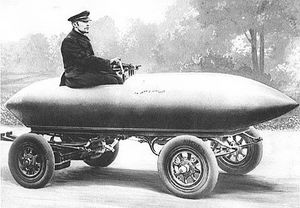.
La Jamais Contente: Difference between revisions
Red marquis (talk | contribs) No edit summary |
Red marquis (talk | contribs) No edit summary |
||
| Line 1: | Line 1: | ||
{| border=0 cellspacing=0 cellpadding=4 style="float:right; margin:0 0 .5em 1em; width:250px; background:#fff; border-collapse:collapse; border:1px solid #999; font-size:83%; line-height:1.5; " summary="Infobox Automobile" | {| border=0 cellspacing=0 cellpadding=4 style="float:right; margin:0 0 .5em 1em; width:250px; background:#fff; border-collapse:collapse; border:1px solid #999; font-size:83%; line-height:1.5; " summary="Infobox Automobile" | ||
|- style="text-align:center; background:#f0f0f0;" | |- style="text-align:center; background:#f0f0f0;" | ||
| colspan=2 style="padding:0; background:#996; color:#fff; border-bottom:1px solid #999;" | | | colspan=2 style="padding:0; background:#996; color:#fff; border-bottom:1px solid #999;" | [[Image:Jamais contente.jpg|300px]] | ||
|- style="color:#fff; background:#996; font-size:larger;" | |- style="color:#fff; background:#996; font-size:larger;" | ||
! colspan=2 | '''{{PAGENAME}}''' | ! colspan=2 | '''{{PAGENAME}}''' | ||
Revision as of 22:58, 18 June 2007

| |
| La Jamais Contente | |
|---|---|
| Jenatzy | |
| aka | n°25 |
| Production | |
| Class | |
| Body Style | |
| Length | |
| Width | |
| Height | |
| Wheelbase | |
| Weight | |
| Transmission | |
| Engine | |
| Power | |
| Similar | |
| Designer | |
La Jamais Contente (The Never Satisfied) was the first vehicle to go over 100 km/h. It was an electric vehicle with light alloy torpedo shaped bodywork (although the high position of the driver spoiled much of the aerodynamics). Chassis number was n°25. The land speed record was established, according to sources, on April 29 or May 1 1899 at Achères, Yvelines near Paris, France. The vehicle had two direct drive Postel-Vinay 25 kW motors, running at 200 V drawing 124 Amperes <ref>{{#if: EV Zero?
|{{#if:
| {{#if:
| [[{{{authorlink}}}|{{#if:
| {{{last}}}{{#if: | , {{{first}}} }}
| {{{author}}}
}}]]
| {{#if:
| {{{last}}}{{#if: | , {{{first}}} }}
| {{{author}}}
}}
}}
}}{{#if:
| {{#if: | , {{{coauthors}}} }}.
}}{{#if: |“|"}}{{#if: http://ev1-club.power.net/torpedo.htm
| EV Zero?
| EV Zero?
}}{{#if: |”|"}}{{#if: | ({{{format}}})
}}{{#if:
| , {{{work}}}}}{{#if: EV1 Club
| , EV1 Club
}}{{#if:
| , {{{date}}}
}}{{#if:
| , pp. {{{pages}}}
|{{#if:
| , p. {{{page}}}
}}
}}{{#if: 2006-10-18
| . Retrieved on 2006-10-18
}}.{{#if:
| (in )
}}{{ #if:
| “{{{quote}}}”
}}|Template error: argument title is required.}}</ref>, and was equipped with Michelin tires.
See Wikicars' comprehensive <MODEL> Review.
Photos
Pilot
The pilot, Belgian Camille Jenatzy, was son of Constant Jenatzy a manufacturer of rubber tires, which were still a novelty at the time. Camille studied as an engineer. He was interested in electric traction automobiles, an interest which he put to use around 1898.
Motivation
Desiring to carve a place in the promissing Parisian electric carriage market, Jenatzy started a manufacturing plant which would produce many electric carriages and trucks. He fiercely competed against carriage maker Jeantaud in publicity stunts to see which made the fastest vehicles. In order to assure the triumph of his corporation, Jenatzy built a bullet shaped prototype, conceived by the carriage maker Rothschild in partinium (an alloy of laminated aluminium, tungsten and magnesium).
Speed Record
He reached 105.882 km/h (65.792 mph); pulverising the previous record by Count Gaston de Chasseloup-Laubat which had attained 92.78 km/h (57.65 mph) on March 4 1899.
After this exploit the combustion engine using gasoline would suplant electric tecnology for the next century.
The vehicle is in the automobile museum at Compiègne (Oise).
References
1. ^ "EV Zero?", EV1 Club. Retrieved on 2006-10-18.
External Links
| Wikimedia Commons has media related to: |
- Les 100 ans des 100km/h - La Jamais Contente à Achères (French)
